Spectre Blu-ray Movie
HomeSpectre Blu-ray Movie 
Blu-ray + UV Digital CopyMetro-Goldwyn-Mayer | 2015 | 148 min | Rated PG-13 | Feb 09, 2016
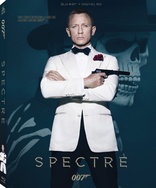
Price
Movie rating
7.1 | / 10 |
Blu-ray rating
| Users | 3.8 | |
| Reviewer | 3.5 | |
| Overall | 3.8 |
Overview
Spectre (2015)
A cryptic message from Bond's past sends him on a trail to uncover a sinister organization. While M battles political forces to keep the secret service alive, Bond peels back the layers of deceit to reveal the terrible truth behind SPECTRE.
Starring: Daniel Craig, Christoph Waltz, Léa Seydoux, Ralph Fiennes, Monica BellucciDirector: Sam Mendes
| Action | Uncertain |
| Adventure | Uncertain |
| Thriller | Uncertain |
| Crime | Uncertain |
Specifications
Video
Video codec: MPEG-4 AVC
Video resolution: 1080p
Aspect ratio: 2.38:1
Original aspect ratio: 2.39:1
Audio
English: DTS-HD Master Audio 7.1 (48kHz, 24-bit)
English: Dolby Digital 5.1 (448 kbps)
French (Canada): Dolby Digital 5.1
Portuguese: Dolby Digital 5.1
Spanish: Dolby Digital 5.1 (448 kbps)
Subtitles
English SDH, French, Portuguese, Spanish
Discs
50GB Blu-ray Disc
Single disc (1 BD)
UV digital copy
Packaging
Slipcover in original pressing
Playback
Region A, B (locked)
Review
Rating summary
| Movie | 3.0 | |
| Video | 5.0 | |
| Audio | 5.0 | |
| Extras | 2.5 | |
| Overall | 3.5 |
Spectre Blu-ray Movie Review
We've Been Here Before
Reviewed by Michael Reuben February 7, 2016Spectre, the twenty-fourth Bond film from EON Productions, racked up impressive box office
returns, but it also divided fans. "It's no Skyfall!" was a common reaction among the
disappointed (which included my colleague Brian Orndorf). Then again, I
recall when Skyfall
was similarly dismissed with "It's
no Casino Royale!" As far as I know, no one has
ever cited
Quantum of Solace, Daniel Craig's second
Bond outing, as a standard to which other efforts
should aspire, but the trend seems clear: Each of Craig's followup Bond films has left part of the
fan base with the nagging sense that the new film somehow falls short.
What accounts for this continuing sense of letdown? My theory is that it's driven by a change in
the way Bond films are written, one that began with Casino
Royale's "reboot" of the franchise.
Following the path that Ian Fleming mapped in the first of his Bond novels, Craig's debut
burrowed more deeply into Bond's character than any previous film (with the possible exception
of George Lazenby's one-off turn in On Her
Majesty's Secret Service). In the film as in the
novel, Bond found his emotional vulnerabilities exploited and the last of his illusions stripped
away. As Casino Royale's ad campaign promised, the film showed us how Bond became
Bond—that is, how the newly licensed-to-kill 007 became the emotionally contained, self-sufficient hero who, in so many previous films, blithely
walked into danger.
But the franchise's creators didn't stop there. In each of Craig's successive outings, the focus on
Bond's inner life has remained an essential element (and yes, I hesitated before writing the
phrase "Bond's inner life", which would have been an oxymoron for the character played by
Sean Connery, Roger Moore, Timothy Dalton and Pierce Brosnan). In each subsequent film,
Craig's Bond has remained a man battling personal demons, some present and some past.
Despite his repeated assertions that nothing bothers him, that he doesn't reflect on his choices in
life, that he's an emotional cold fish who leaps from one adventure and bed to the next, Craig's
Bond always finds that his latest mission stirs up a deep well of feeling, whether it's love for
Vesper Lynd, devotion to Judi Dench's M, or sorrow for his lost family. Principal screenwriters
Neil Purvis and Robert Wade have admitted to mining every scrap of information tossed out by
Ian Fleming for inspiration in their effort to "deepen" Bond's character. No one seems to have
questioned whether relentlessly excavating Bond's history and psychology was a wise decision
for a franchise that has survived over fifty years because its hero always manages to emerge from
disaster unscathed, both inside and out.
Spectre represents the apotheosis of the Purvis/Wade approach, as it systematically revisits and
reformulates Craig's previous Bond outings, purporting to reveal an ultimate enemy who has
lurked unidentified behind the scenes of three feature films and billions of dollars in box office.
The marketing made no secret of the fact that, in what amounts to yet another "reboot" of the
franchise, Bond's chief enemy isn't just a Serious Bad Guy. He's a figure from Bond's own past,
one who mockingly informs 007 that it's Bond who is responsible for the villain's career as an
evil genius. Such intimate ties between a hero and his nemesis are the stuff of Greek tragedy,
Shakespearean drama and comic book franchises, but how many times do the impresarios of
EON think they can get away with it for Bond?
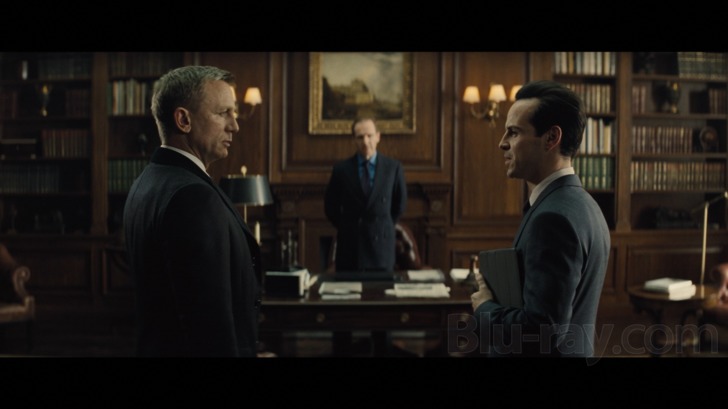
As so often in the past, Bond in Spectre is forced into the role of rogue agent, pursuing a lead from an unlikely source that eventually brings him to the mysterious Franz Oberhauser (Christoph Waltz) and his shadowy criminal organization with its octopus insignia. The path to Oberhauser begins in Mexico City, where director Sam Mendes stages an elaborate chase during the Day of the Dead celebration, complete with collapsing buildings, aerial hijinks and a massive crowd of extras. The pursuit continues to Rome, where Bond secures further information—and spends a few memorable hours—with Lucia Sciarra (Monica Belucci), the widow of a recently deceased Spectre assassin. In Rome, Bond catches his first glimpse of Oberhauser (whom he recognizes as a figure from his past) and manages the first of several escapes from an apparently indestructible Spectre assassin named Hinx (WWE star Dave Bautista, who played Drax in Guardians of the Galaxy). The trail then leads to Austria, where an encounter with an old adversary sends Bond to an Alpine clinic seeking the gorgeous Dr. Madeline Swann (Léa Seydoux), and then to Tangier, where Bond discovers the location of Oberhauser's lair in the Moroccan desert.
Back in London, the new M (Ralph Fiennes), along with Q (Ben Wishaw), Moneypenny (Naomie Harris) and Tanner (Rory Kinnear), are facing the dismantlement of MI6 at the hands of Max Denbigh, a/k/a "C" (Andrew Scott, Sherlock's Moriarty), apostle of a shining new age of electronic espionage. As Denbigh moves forward with his plan to consolidate the intelligence services of Britain and eight other nations in a secure London headquarters over which he will have sole dominion, no one except M seems concerned that privacy and democracy will be thrown out the window along with the "00" section. (Is no one even a little troubled that the construction of Denbigh's spiffy steel-and-glass tower was funded by private contributions? )
The conclusion of Spectre attempts to unite these many moving parts in a grand finale with the requisite pyrotechnics, narrow escapes and just desserts for the villains, but there's something off about the whole affair—and not just because we're asked to believe that Bond emerges from the fray a changed man. The late Richard Maibaum, screenwriter of twelve Bonds, used to say that the film's story should be driven by the villain's evil objective. A plot to subvert the entire Western intelligence apparatus sounds like a grand scheme, but when it's motivated by what amounts to sibling rivalry, the whole affair is trivialized. Skyfall lost some momentum at the end, because it turned out that its villain's elaborate machinations boiled down to a simple act of revenge against "Mommy". But Spectre collapses entirely, because it doesn't even try to hide the fact that Oberhauser is doing it all to get even with Bond.
Spectre Blu-ray Movie, Video Quality 
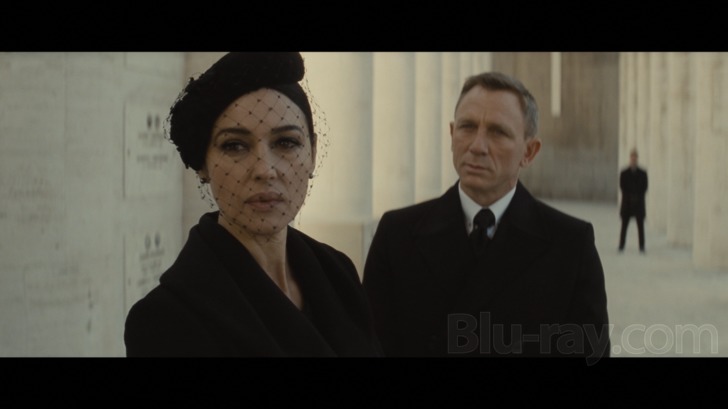
Unlike the digitally originated Skyfall,
Spectre was shot on film, with select shots captured
digitally. The cinematographer was Swiss-born DP Hoyte Van Hoytema, whose previous credits
include Interstellar and Tinker Tailor Soldier Spy. If IMDb is to believed,
post-production was
completed on a digital intermediate at 4k, which makes sense for a film that was intended to be
widely exhibited on IMAX screens as well as in regular theaters. The DI process, together with
contemporary film stocks and lenses, results in a detailed and fine-grained image on MGM's
1080p, AVC-encoded Blu-ray, which renders even the darkest sequences with exceptional
clarity. The shadows that frequently conceal Christoph Waltz's Franz Oberhauser are deep and
black, and they lift with precision at just the right moments. Digital color grading provides a
distinctive palette for each location, from the yellowed air of Mexico City (with its legendary
pollution) to the cool blues and whites of the Alpine clinic where Bond connects with Dr. Swann.
Fine detail is so good that even the aerial shots of crowds in the Day of the Dead sequence reveal
individual figures on the ground.
Spectre has the longest running time of any of EON Productions' Bond films to date, and MGM
has mastered the 148-minute feature with an average bitrate of 24.09 Mbps. Between the
letterbox bars and obvious care taken in the compression, the image has transferred to Blu-ray
without artifacts or other interference.
Spectre Blu-ray Movie, Audio Quality 
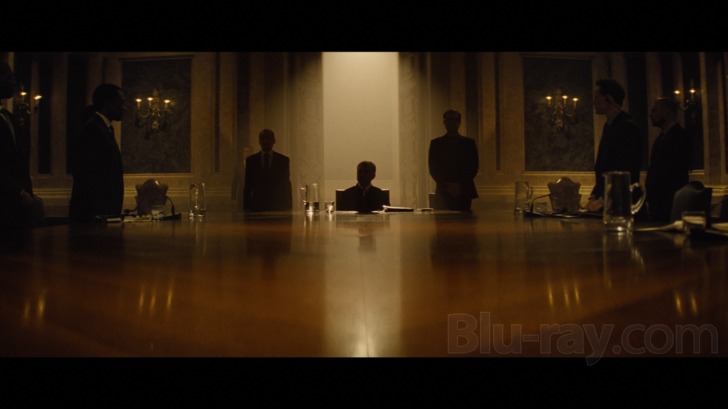
Spectre's lossless DTS-HD MA 7.1 track announces its authoritative presence with deep bass
drum beats that initiate the Day of the Dead sequence, and the rest of the track reflects the same
approach that director Mendes followed in Skyfall: a
near-constant cacophony of organized sound
accompanying Bond and his allies through every phase of the adventure. The Mexico City
sequence surrounds the viewer with street bands and revelers, then explodes (literally) into a
boisterous chase that includes a helicopter fight where the sound of whirring blades shifts with
the perspective onscreen. A car chase through Rome is a whirlwind of engines, collisions and fire
effects. A snowy mountain pursuit involving multiple vehicles and an airplane is . . . well, you'll
just have to hear it for yourself. Even the quieter scenes, in rooms with humming computers and
multiple screens, have a distinct sonic identity. Like Skyfall, Spectre could be listened to without
the picture, and it would never be boring.
Mendes' favorite composer, Thomas Newman, returns for scoring duties, and the unenviable job
of following up Adele's Oscar-winning theme from Skyfall fell to Sam Smith, who co-wrote and
performs "Writing's on the Wall" over the inky title sequence.
Spectre Blu-ray Movie, Special Features and Extras 

By comparison to the impressive batch of extras accompanying Skyfall, including a great
commentary by Mendes, Spectre's supplements seem flimsy. Some fans have predicted a special
edition with additional material like that done for Casino
Royale, but that was a Sony release.
Don't count on MGM to go the extra mile.
- Spectre: Bond's Biggest Opening Sequence (1080p; 1.78:1; 20:12): Once you get past the promotional tone, this detailed look at filming the Day of the Dead sequence in Mexico City provides a good sense of the challenging logistics involved. The featurette concludes with the film's Mexican premiere.
- Video Blogs (1080p; 1.78:1; 9:09): These featurettes are entertaining but all too brief. A "play all" function is included.
- Director—Sam Mendes
- Supercars
- Introducing Léa Seydoux and Monica Belucci
- Action
- Music
- Guinness World Record
- Gallery (1080p): Production and behind-the-scenes photos.
- Theatrical Trailers (1080p; 2.38:1; 5:18): A "play all" function is included.
- Teaser Trailer
- Theatrical Trailer #1
- Theatrical Trailer #2
Spectre Blu-ray Movie, Overall Score and Recommendation 
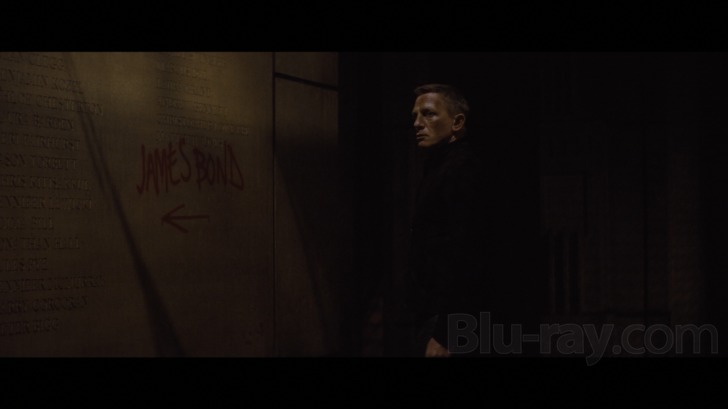
Despite its problems, Spectre is a Bond film, and Bond fans are loyal. With repeat viewings, I
suspect that Spectre's flaws will retreat from attention, and fans will concentrate on individual
sequences that are memorable, primarily in the film's first half. Though light on extras, the Blu-ray is a first-rate production and recommended.
Other editions
Spectre: Other Editions
Similar titles
Similar titles you might also like

Skyfall 4K
2012

Die Another Day
2002

Quantum of Solace 4K
2008

Casino Royale
2006

Mission: Impossible - Dead Reckoning Part One 4K
2023

Fast & Furious Presents: Hobbs & Shaw
2019

GoldenEye
1995

The Spy Who Loved Me
1977

Mission: Impossible - Rogue Nation 4K
2015

Mission: Impossible - Fallout 4K
IMAX Aspect Ratio
2018

No Time to Die
Collector's Edition
2021

Licence to Kill
1989

A View to a Kill
1985

Octopussy
1983

Tomorrow Never Dies
1997

The World Is Not Enough
1999

The Fate of the Furious
2017

The Bourne Ultimatum 4K
2007

Mission: Impossible - Ghost Protocol 4K
2011

Live and Let Die
1973





